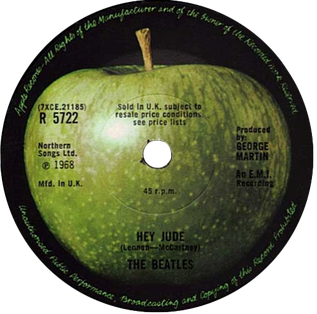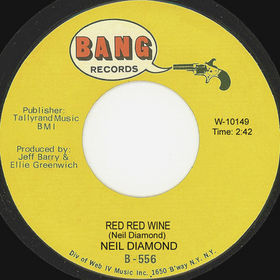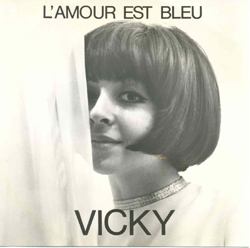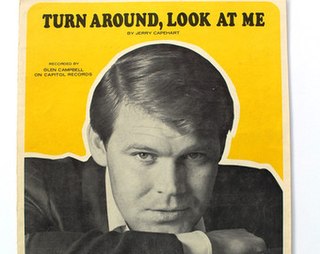
"With a Little Help from My Friends" is a song by the English rock band the Beatles, from their 1967 album Sgt. Pepper's Lonely Hearts Club Band. It was written by John Lennon and Paul McCartney and sung by drummer Ringo Starr, his lead vocal for the album. As the second track on the album, it segues from the applause of the title track.

"Hey Jude" is a song by the English rock band the Beatles that was released as a non-album single in August 1968. It was written by Paul McCartney and credited to the Lennon–McCartney partnership. The single was the Beatles' first release on their Apple record label and one of the "First Four" singles by Apple's roster of artists, marking the label's public launch. "Hey Jude" was a number-one hit in many countries around the world and became the year's top-selling single in the UK, the US, Australia and Canada. Its nine-week run at number one on the Billboard Hot 100 tied the all-time record in 1968 for the longest run at the top of the US charts, a record it held for nine years. It has sold approximately eight million copies and is frequently included on music critics' lists of the greatest songs of all time.

"Gentle on My Mind" is a song that was written and originally recorded by John Hartford, and released on his second studio album, Earthwords & Music (1967). Hartford composed the song after watching Doctor Zhivago in 1966, as he was inspired by the film and his own personal experiences. The lyrics describe the reminiscences of lost love of a man as he travels through the country. The following year, Hartford released the song as a single on RCA Records.

"Born to Be Wild" is a song written by Mars Bonfire and first performed by the band Steppenwolf. The song is often invoked in both popular and counter culture to denote a biker appearance or attitude. It is most notably featured in the 1969 film Easy Rider. It is sometimes described as the first heavy metal song, and the second verse lyric "heavy metal thunder" marks the first use of this term in rock music.

"Love Child" is a 1968 song released by the Motown label for Diana Ross & the Supremes. The second single and title track from their album Love Child, it became the Supremes' 11th number-one single in the United States, where it sold 500,000 in its first week and 2 million copies by year's end.

"MacArthur Park" is a song written by American singer-songwriter Jimmy Webb that was recorded first by Irish actor and singer Richard Harris in 1968. Harris's version peaked at number two on the Billboard Hot 100 chart and number four on the UK Singles Chart. "MacArthur Park" was subsequently covered by numerous artists, including a 1969 Grammy-winning version by country music singer Waylon Jennings and a number one Billboard Hot 100 disco arrangement by Donna Summer in 1978.

"You're All I Need to Get By" is a song recorded by the American R&B/soul duo Marvin Gaye and Tammi Terrell and released on Motown Records' Tamla label in 1968. It was the basis for the 1995 single "I'll Be There for You/You're All I Need to Get By" from Method Man and Mary J. Blige.

"Red Red Wine" is a song originally written, performed and recorded by American singer Neil Diamond in 1967 that appears on his second studio album, Just for You. The lyrics are written from the perspective of a person who finds that drinking red wine is the only way to forget his woes.

"Those Were the Days" is a song credited to Gene Raskin, who put a new English lyric to the Russian romance song "Дорогой длинною", composed by Boris Fomin (1900–1948) with words by the poet Konstantin Podrevsky. It deals with reminiscence upon youth and romantic idealism. It also deals with tavern activities, which include drinking, singing and dancing.

"Angel of the Morning" is a popular song written by Chip Taylor, originally recorded by Evie Sands, but first charting by Merrilee Rush. The song has been covered by many artists including P. P. Arnold, Connie Eaton, Mary Mason, Guys 'n' Dolls, Melba Montgomery, Olivia Newton-John, Bettye Swann and, most recognizably, by Juice Newton.

"I Say a Little Prayer" is a song written by Burt Bacharach and Hal David for Dionne Warwick, originally peaking at number four on the U.S. Billboard Hot 100 pop singles chart in December 1967. On the R&B Singles chart it peaked at number eight.
"Green, Green Grass of Home", written by Claude "Curly" Putman Jr., and first recorded by singer Johnny Darrell in 1965, is a country song made popular by Porter Wagoner the same year, when it reached No. 4 on the Country chart. It was also recorded by Bobby Bare and by Jerry Lee Lewis, who included it in his album Country Songs for City Folks. Tom Jones learned the song from Lewis' version and, in 1966, he had a worldwide No. 1 hit with it.
"Dream a Little Dream of Me" is a 1931 song with music by Fabian Andre and Wilbur Schwandt and lyrics by Gus Kahn. It was first recorded in February 1931 by Ozzie Nelson and also by Wayne King and His Orchestra, with vocals by Ernie Birchill. A popular standard, it has seen more than 60 other versions recorded.

"L'amour est bleu" is a song whose music was composed by André Popp, and whose lyrics were written by Pierre Cour, in 1967. Bryan Blackburn later wrote English-language lyrics for it. First performed in French by Greek singer Vicky Leandros as the Luxembourgish entry in the Eurovision Song Contest 1967, it has since been recorded by many other musicians, most notably French orchestra leader Paul Mauriat, whose familiar instrumental version became the only number-one hit by a French lead artist to top the Billboard Hot 100 in America.

"Turn Around, Look at Me" is a song written by Jerry Capehart and Glen Campbell, though Campbell is not officially credited.

"This Guy's in Love with You" is a song written by Burt Bacharach and Hal David, and recorded by Herb Alpert. Although known primarily for his trumpet playing as the leader of the Tijuana Brass, Alpert sang lead vocals on this solo recording, arranged by Bacharach. An earlier recording of the song was by British singer Danny Williams titled "That Guy's in Love", which appears on his 1968 self-titled album.
Ö3 Austria Top 40 is the official Austrian singles chart, as well as the radio show which presents it, aired Tuesdays on Hitradio Ö3. The show presents the Austrian singles, ringtones and downloads chart. It premiered on 26 November 1968 as Disc Parade and was presented by Ernst Grissemann. The show has had other names and other presenters, as detailed below.
The Swiss Hitparade is Switzerland's main music sales charts. The charts are a record of the highest-selling singles and albums in various genres in Switzerland.
"Little Green Apples" is a song written by Bobby Russell that became a hit for three different artists, with their three separate releases, in 1968. Originally written for and released by American recording artist Roger Miller, "Little Green Apples" was also released as a single by American recording artists Patti Page and O. C. Smith that same year. Miller's version became a Top 40 hit on the Billboard Hot 100 chart and on the UK Singles Chart, while Page's version became her last Hot 100 entry and Smith's version became a #2 hit on the Hot 100 chart. The song earned Russell a Grammy Award for Song of the Year and for Best Country Song. In 2013, "Little Green Apples" was covered by English recording artist Robbie Williams featuring American recording artist Kelly Clarkson, which became a top 40 hit in Mexico.

"(Sittin' On) The Dock of the Bay" is a song co-written by soul singer Otis Redding and guitarist Steve Cropper. It was recorded by Redding twice in 1967, including once just three days before his death in a plane crash on December 10, 1967. The song was released on Stax Records' Volt label in 1968, becoming the first ever posthumous single to top the charts in the US. It reached number 3 on the UK Singles Chart.